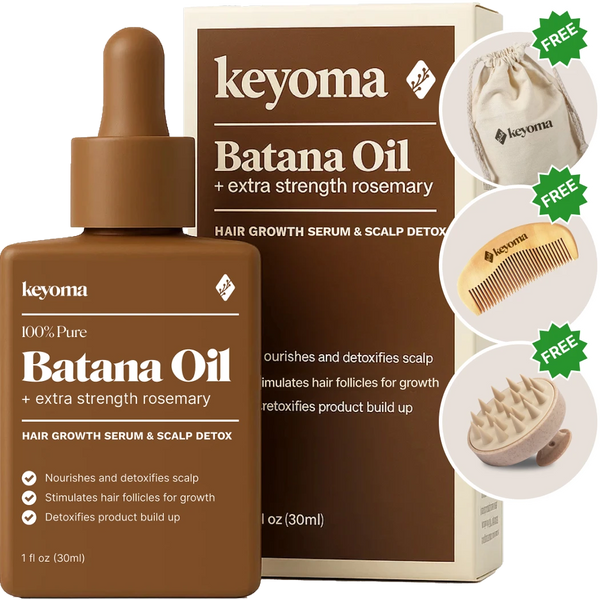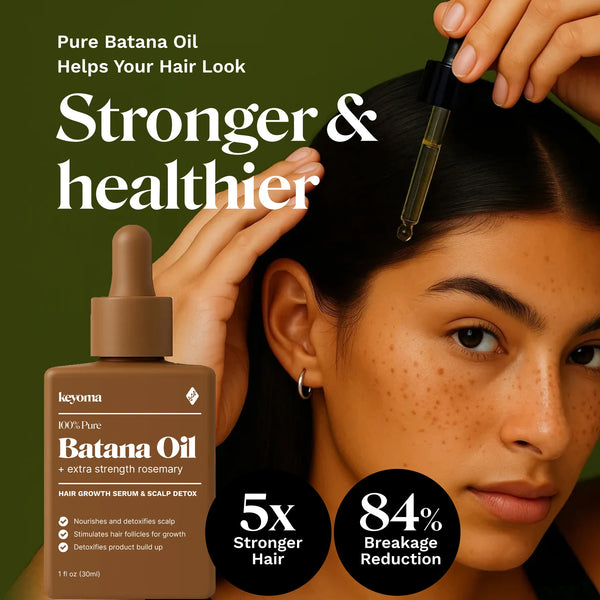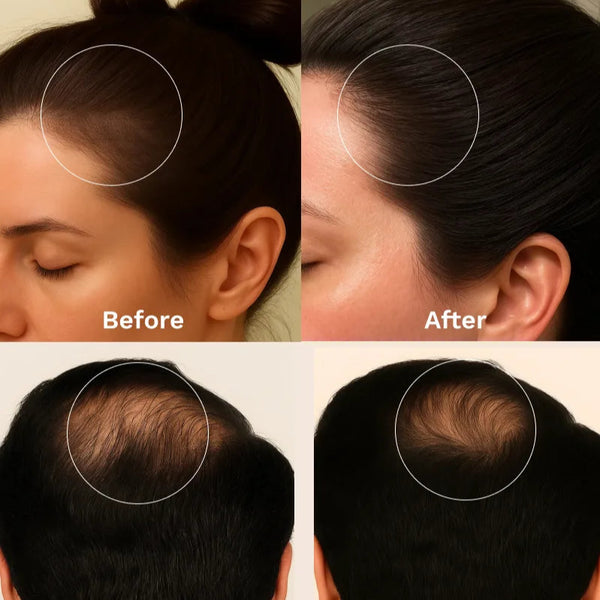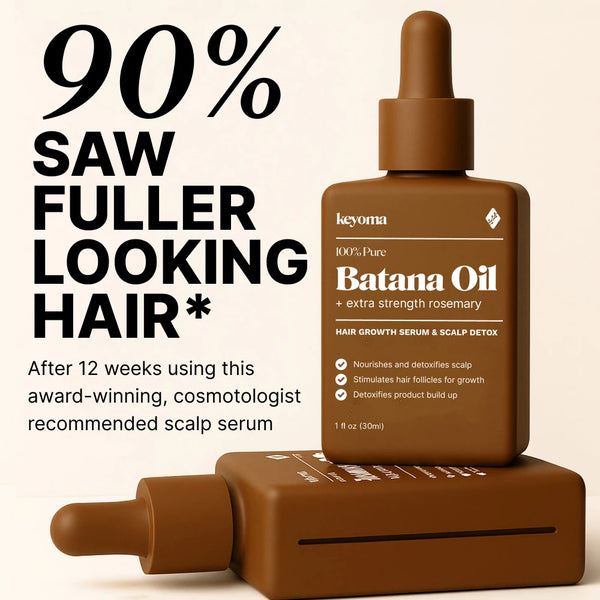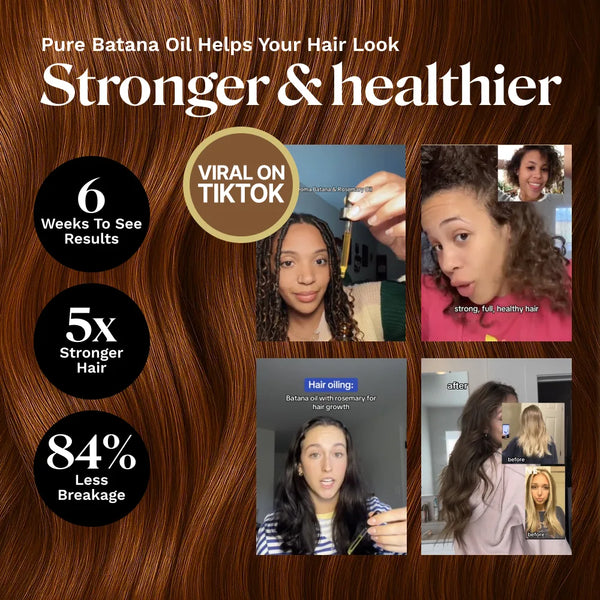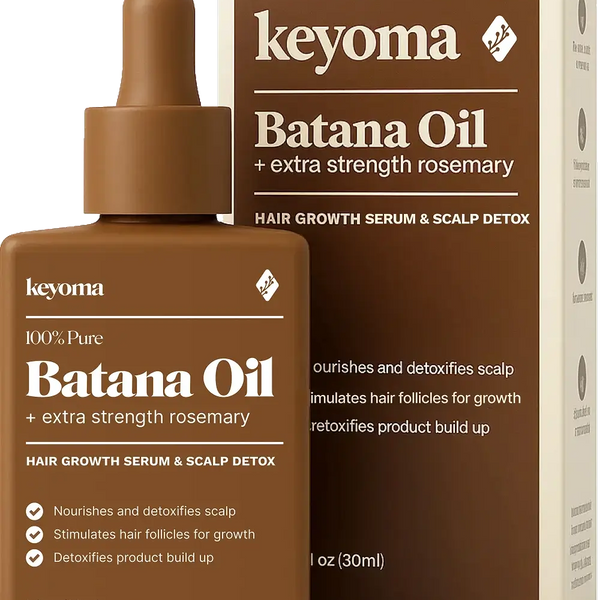In this article
When you begin exploring solutions for thinning hair, you’ll come across prescription medications, topical formulas, and herbal compounds—each claiming to restore hair. You might ask what scientific evidence supports using herbs for alopecia, the general term for hair loss. Which herbs encourage regrowth? Can natural remedies make a difference for male pattern baldness?
Here’s what current research says about 29 hair-boosting herbs and other plant-based therapies that may offer support.
Do Herbal Remedies Help With Hair Loss?
It’s easy to assume that herbs for hair loss are all hype. The idea sounds unrealistic.
You won’t see dramatic regrowth by swallowing a few herbal capsules—especially if male pattern baldness has been progressing for years. But some herbal supplements promoted for hair loss have shown promise in early studies.
A recent research review found that some concentrated plant extracts may extend the hair’s growth phase. These herbs may also lower oxidative stress, reduce inflammation, slow cell aging, and minimize hormone-related damage—factors linked to hair thinning.
Still, most of the evidence comes from lab tests, not clinical trials. More human studies are needed before anyone can draw firm conclusions.
29 Natural and Holistic Hair Loss Remedies
Natural hair regrowth options fall under complementary and alternative medicine (CAM), which includes treatments free from synthetic chemicals or prescription drugs. These appeal to people seeking solutions without the side effects of pharmaceutical alopecia treatments.
Natural treatments help stimulate regrowth by:
-
Activating hair follicles
-
Supporting hormonal balance to restart growth cycles
-
Improving scalp condition
-
Reducing inflammation and enhancing scalp health
Looking to stop hair shedding and promote regrowth without drugs?
|
Common Name |
Scientific Name |
|
|
1 |
Batana |
(Elaeis Oleifera) |
|
2 |
Rosemary |
(Rosmarinus Officinalis) |
|
3 |
Coconut |
(Cocos Nucifera) |
|
4 |
Tea Tree |
(Melaleuca Alternifolia) |
|
5 |
Aloe Vera |
(A. Barbadensis Mill.) |
|
6 |
Lavender |
(Lavandula Angustifolia) |
|
7 |
Peppermint |
(Mentha × Piperita) |
|
8 |
Fenugreek |
(Trigonella Foenum-Graecum) |
|
9 |
Ginseng |
(Panax Ginseng) |
|
10 |
Gooseberry |
(Emblica Officinalis) |
|
11 |
Hibiscus |
(Hibiscus Rosa-Sinensis) |
|
12 |
Holy Basil |
(Ocimum Sanctum) |
|
13 |
Sage |
(Salvia Officinalis) |
|
14 |
Red Clover |
(Trifolium Pratense) |
|
15 |
Stinging Nettle |
(Urtica Dioica) |
|
16 |
Gotu Kola |
(Centella Asiatica) |
|
17 |
Tuber Fleeceflower |
(Polygonum Multiflorum) |
|
18 |
Brahmi |
(Bacopa Monnieri) |
|
19 |
Jatamansi |
(Nardostachys jatamansi) |
|
20 |
False daisy |
(Eclipta alba) |
|
21 |
Marking Nut |
(Semecarpus Anacardium) |
|
22 |
Night-Flowering Jasmine |
(Nyctanthes Arbortristis) |
|
23 |
Espinosilla |
(Loeselia Mexicana) |
|
24 |
Coat Buttons |
(Tridax Procumbent) |
|
25 |
Giant Dodder |
(Cuscuta Reflexa Roxb) |
|
26 |
Oriental Arborvitae |
(Thuja Orientalis) |
|
27 |
Goji Berry |
(Lycium Chinense Mill) |
|
28 |
Bitter Apple |
(Citrullus Colocynthis) |
|
29 |
Horsetail |
(Equisetum Arvense) |
Below are nine popular natural methods, ranked by effectiveness. You’ll also find additional tips for encouraging faster, fuller hair growth.
1. Batana Oil (Elaeis Oleifera)
Batana oil supports follicle health by moisturizing the scalp and forming a protective barrier that locks in hydration. Unlike synthetic treatments, it doesn't rely on harsh chemicals. Instead, it supplies hair with essential lipids and antioxidants that support a healthier growth environment.
2. Rosemary Oil (Rosmarinus Officinalis)
Studies show rosemary oil may work as effectively as minoxidil in promoting hair regrowth. Apply it directly to the scalp and massage it in to help stimulate follicles and boost circulation.
3. Coconut (Cocos Nucifera)
Coconut oil helps protect against protein loss and supports scalp health. Though not proven to regrow hair, it’s a safe, low-risk option. You can use it in solid or liquid form as a conditioning agent to reduce breakage and dryness.
4. Tea Tree Oil (Melaleuca Alternifolia)
Tea tree oil may help reduce dandruff by improving seborrheic dermatitis, a skin condition linked to scalp irritation. Known for its antifungal and antibacterial effects, it’s often used in scalp care products. While current research doesn’t confirm its ability to promote hair growth, it doesn’t harm hair health and can support a cleaner scalp environment.
5. Aloe Vera (A. Barbadensis Mill.)
Aloe vera is a tropical plant often used for burns and gut issues. It may also help maintain a clean, balanced scalp environment, which can promote stronger hair regrowth.
6. Lavender (Lavandula Angustifolia)
Lavender oil may support hair growth when applied to the scalp. A 2016 animal study found that 3–5% lavender oil increased the number and depth of hair follicles. Deeper follicles may reduce hair shedding. However, minoxidil showed more dramatic results in the same study.
7. Peppermint (Mentha × Piperita)
Peppermint oil may stimulate the anagen phase of the hair cycle. A 2014 mouse study found that 3% peppermint oil improved blood flow to follicles and promoted visible regrowth. Human research is still lacking, so results may vary.
Understand the connection between hormones and hair loss
8. Fenugreek (Trigonella Foenum-Graecum)
Fenugreek, a legume and culinary spice, may support fuller hair. A 2006 study found that fenugreek seed extract increased volume and density in people with mild to moderate hair loss.
9. Ginseng (Panax Ginseng)
Ginseng is a long-standing herbal remedy known to combat thinning. It contains saponins that may block 5-alpha-reductase, an enzyme linked to male-pattern baldness.
10. Gooseberry (Emblica Officinalis)
Gooseberry, also called amla, is rich in antioxidants and often used in Ayurveda to strengthen strands and support scalp health for fuller hair.
11. Hibiscus (Hibiscus Rosa-Sinensis)
Hibiscus, known for its bright flowers, may help stimulate hair growth. Animal studies using a 10% ethanol extract showed increased hair production. While initial results are positive, human trials are needed to confirm its effectiveness.
12. Holy Basil (Ocimum Sanctum)
Holy basil, an aromatic adaptogen, may reduce shedding tied to scalp irritation, flaking, or hormonal imbalances.
13. Sage (Salvia Officinalis)
Common in cooking, sage might also support hair growth. A 2020 animal study found it activates dermal papilla cells—critical components of hair follicles. While the findings are early and based on mouse models, the results suggest potential benefits for stimulating hair growth.
Discover different ways on how to regrow your hair
14. Red Clover (Trifolium Pratense)
Red clover contains isoflavones, which are plant compounds similar to estrogen. These compounds may block the conversion of testosterone to DHT, a hormone linked to hair thinning.
A small study on 30 men using 5% red clover extract for four months saw a 13% increase in hair's active growth phase and a 29% drop in resting phase hair. While promising, these findings need more support from larger studies.
15. Stinging Nettle (Urtica Dioica)
Stinging nettle offers antibacterial and anti-inflammatory benefits for scalp health. While direct evidence linking it to hair regrowth is limited, it may help reduce DHT by inhibiting the 5α-reductase enzyme. This mechanism suggests potential for addressing male pattern baldness. It’s used in some shampoos, but avoid applying the raw plant due to its stinging effects.
16. Gotu Kola (Centella Asiatica)
Gotu kola is widely used in traditional medicine. It may stimulate scalp circulation, boost follicle function, and extend hair shaft length.
17. Tuber Fleeceflower (Polygonum Multiflorum)
This root is a traditional remedy in Chinese medicine for treating baldness. It contains compounds that block 5α-reductase, the enzyme linked to hair follicle miniaturization. It also encourages hair follicles to enter their active growth phase.
18. Brahmi (Bacopa Monnieri)
Brahmi, or bacopa, is a trailing plant used in Ayurvedic medicine. Its alkaloids may activate proteins linked to hair strand development and follicle activity.
19. Jatamansi (Nardostachys jatamansi)
Jatamansi is a shrub with rhizomes that may help accelerate hair regeneration. Studies show it improves hair recovery in cases of chemotherapy-induced alopecia.
Explore hair loss treatment you can do at home
20. False daisy (Eclipta alba)
False daisy is an herb used to stimulate follicles. One study found it boosted the speed of new hair development in lab animals.
21. Marking Nut (Semecarpus Anacardium)
Marking nut, used in Ayurvedic and Siddha systems, grows in sub-Himalayan regions. It has a long history as a hair regrowth remedy, though more studies are needed to confirm how safe or effective it is.
22. Night-Flowering Jasmine (Nyctanthes Arbortristis)
This flowering bush from South Asia may support regrowth. A 2016 study found it helped trigger hair restoration in test animals with alopecia.
23. Espinosilla (Loeselia Mexicana)
Espinosilla, native to Mexico, is known to support scalp health and reinforce hair roots. A 2014 animal study found it contributed to hair regrowth in male mice.
24. Coat Buttons (Tridax Procumbent)
This daisy-family herb grows along the ground and contains antioxidants. It supports hair regrowth both on its own and when combined with other plant-based treatments.
25. Giant Dodder (Cuscuta Reflexa Roxb)
This climbing Ayurvedic herb may counter hair thinning triggered by steroid hormones. Research shows it blocks the 5-alpha-reductase enzyme, a known factor in hormonal hair loss.
26. Oriental Arborvitae (Thuja Orientalis)
This evergreen from the cypress group is a traditional baldness treatment. Research from 2013 showed it promoted the active growth phase in hair follicles that were previously dormant.
27. Goji Berry (Lycium Chinense Mill)
Goji berry, a fruit used in Chinese medicine, contains zinc, which supports sebum production in the scalp. This oil helps minimize dandruff — a known contributor to hair thinning.
28. Bitter Apple (Citrullus Colocynthis)
Bitter apple is a desert fruit used in Ayurvedic remedies. The dried pulp contains glycosides, which may activate new hair production.
29. Horsetail (Equisetum Arvense)
Horsetail contains silica, which may help reinforce hair structure. A 2016 review noted that orthosilicic acid, a silica form, can enhance collagen, reduce breakage, and strengthen strands. Direct proof of horsetail driving new hair growth remains limited.
Start Your Natural Hair Routine With Keyoma’s Herbal Oil
Herbs and natural oils can support hair regrowth through multiple mechanisms—from improving scalp circulation to reducing hormonal triggers like DHT. While most plant-based treatments need more research in humans, some, like rosemary and peppermint oil, show results comparable to synthetic options.
If you're ready to try a science-informed, plant-based approach, start with proven ingredients that nourish your scalp and support growth.
Keyoma Batana Oil combines heritage, purity, and efficacy in one formula.
Explore the benefits and take a step toward stronger, fuller hair—naturally.
Featured Product
100% Pure Batana Oil + Rosemary
↓Best Batana Oil to Buy↓
1 Month
Subscribe & Save
- 30-day supply delivered monthly $35
- 30% off for life $6
- Free haircare essentials kit $33
- Free custom wooden comb $10
- Free scalp massager $15
- Free eco-friendly travel bag $8
- 30-Day Money Back Guarantee
- Free Shipping
- Online portal for easy cancel, skip, or pause.
1 Month One Time Purchase
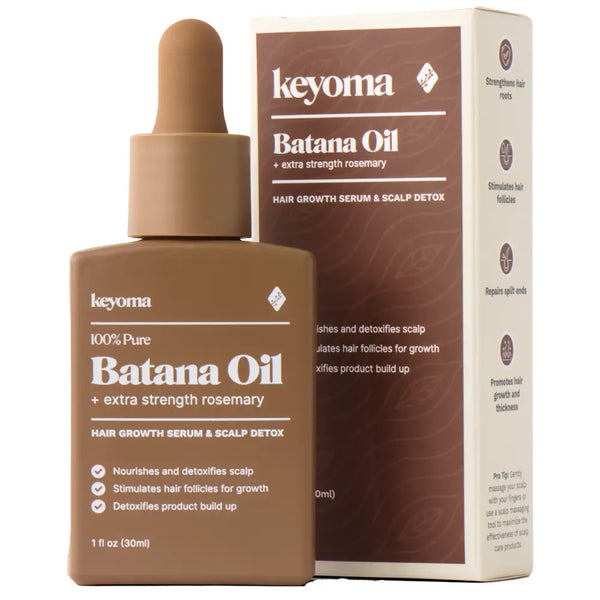
- 30-day supply $50
- 30% off for life $6
- Free haircare essentials kit $33
- Free custom wooden comb $10
- Free scalp massager $15
- Free eco-friendly travel bag $8



